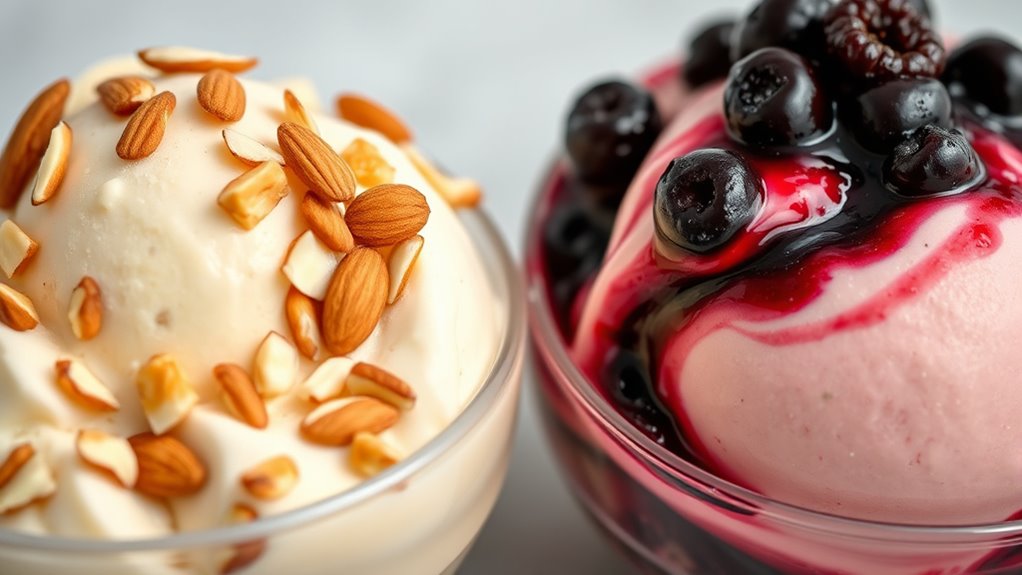When choosing gelato ingredients, understanding how sugar alcohols and natural sugars affect digestion is key. Sugar alcohols like sorbitol can cause fermentation, leading to bloating, gas, and discomfort, especially in sensitive stomachs. Natural sugars are usually absorbed in your small intestine and tend to cause fewer digestive issues. However, in large amounts, they can still produce some fermentation effects. If you’re curious about balancing flavor and digestion, there’s more to contemplate.
Key Takeaways
- Sugar alcohols can cause fermentation in the gut, leading to bloating, gas, and cramping, especially in large amounts.
- Natural sugars are generally absorbed in the small intestine, resulting in fewer gastrointestinal side effects.
- Individuals with sensitive digestion or IBS may experience discomfort from both sugar alcohols and natural sugars.
- Moderation helps determine personal tolerance, as sugar alcohols tend to cause more fermentation-related issues.
- The choice of sweetener technology influences digestion and fermentation, affecting overall gastrointestinal comfort.

When choosing between sugar alcohols and natural sugars, understanding their differences can help you make healthier choices. This knowledge is especially important when enjoying treats like gelato, where ingredients impact your digestion. Sugar alcohols, such as sorbitol and erythritol, are popular sweeteners because they provide sweetness with fewer calories. However, they’re not fully absorbed in your digestive system. Instead, they pass into your gut, where fermentation effects can occur. During fermentation, bacteria in your intestines break down these alcohols, producing gases like carbon dioxide and sometimes causing bloating or discomfort. That’s why some people experience gut irritation after consuming products with sugar alcohols, especially in larger amounts. If you’re sensitive to these effects, you might notice increased bloating, cramping, or flatulence after indulging in gelato made with sugar alcohols.
Natural sugars, like honey, maple syrup, or fruit sugars, are more straightforward in how they interact with your digestive system. They’re usually absorbed more efficiently in your small intestine, which means fewer fermentation effects and less gas production. Because they’re closer to what your body expects from traditional sugars, they tend to cause less gut irritation unless consumed in very high quantities. Still, it’s worth noting that even natural sugars can lead to digestive discomfort if you have conditions like irritable bowel syndrome (IBS), as they can ferment in your gut and produce similar symptoms. But generally, natural sugars are gentler on your digestive system compared to sugar alcohols. Additionally, the type of sweetener technology used in sugar alcohols influences how quickly they are metabolized and how much fermentation occurs.
Natural sugars are easier on digestion and cause less gas than sugar alcohols, but may still affect sensitive stomachs.
When choosing gelato ingredients, consider how your digestive system reacts to each option. If you’re particularly prone to gas, bloating, or other gut irritation, natural sugars may be a safer bet, even though they add more calories. If you’re looking to cut calorie intake or manage blood sugar levels, sugar alcohols might seem appealing, but be mindful of fermentation effects and potential gastrointestinal discomfort. Moderation is key—especially with sugar alcohols—since consuming them in large amounts increases the likelihood of fermentation effects. You can also experiment with small portions to see how your gut responds before enjoying larger servings.
Ultimately, understanding these digestive considerations helps you make informed choices. Whether you prefer the natural sweetness of fruit sugars or the reduced-calorie benefits of sugar alcohols, knowing their fermentation effects and potential for gut irritation lets you enjoy gelato without unexpected discomfort. It’s about finding the right balance that aligns with your health and digestion needs, so you can savor your favorite treats with confidence.
Frequently Asked Questions
How Do Sugar Alcohols Impact Blood Sugar Levels Differently Than Natural Sugars?
When comparing sugar alcohols to natural sugars, you’ll notice that sugar alcohols typically cause a lower glycemic response, meaning they don’t spike your blood sugar as much. This results in a gentler insulin impact, helping you maintain steadier energy levels. Natural sugars, on the other hand, can lead to quick blood sugar increases and more significant insulin responses. So, sugar alcohols might be a better choice if you’re watching your blood sugar.
Are Sugar Alcohols Safe for People With IBS or Digestive Sensitivities?
If you have IBS or digestive sensitivities, you may wonder if sugar alcohols are safe. They can cause digestive discomfort and trigger IBS flare ups in some people because they’re not fully absorbed in your gut. While they’re generally considered safe in moderation, it’s best to pay attention to how your body reacts and limit intake if you experience symptoms like bloating, gas, or pain.
Can Sugar Alcohols Cause Any Long-Term Health Issues?
You might wonder if sugar alcohols pose long-term health risks. While they’re generally safe for occasional use, overdoing it could upset your digestive health, causing bloating or diarrhea. Long-term effects aren’t fully understood, so it’s wise to consume them in moderation. Think of it as walking a tightrope—balance is key. Keep an eye on how your body reacts, and consult your doctor if you notice persistent issues.
Do Natural Sugars Contain Any Beneficial Nutrients Compared to Sugar Alcohols?
Natural sugars often contain beneficial nutrients that sugar alcohols lack. You’ll find higher nutrient density in natural sugars, providing small amounts of vitamins and minerals. Additionally, natural sugars tend to have a higher antioxidant content, helping your body combat oxidative stress. So, choosing natural sugars can offer some nutritional advantages over sugar alcohols, especially if you’re mindful of nutrient intake and overall health.
How Do Sugar Alcohols Influence the Overall Calorie Content of Gelato?
Think of sugar alcohols as tiny calorie pirates, sneaking into gelato to reduce its calorie content without sacrificing sweetness. They offer calorie reduction while maintaining sweetness equivalence, so you get the same delightful taste with fewer calories. This means you can indulge smarter, enjoying your favorite treat without the extra calories that natural sugars might add. It’s a sweet compromise that helps you stay on track while satisfying your cravings.
Conclusion
Choosing between sugar alcohols and natural sugars is like steering a scenic trail—each path has its twists and turns. I once watched a friend enjoy a gelato sweetened with natural sugars, savoring every bite, while another opted for the sugar alcohol version to avoid digestive discomfort. Remember, your digestion is your compass; understanding how each affects you helps you enjoy your favorite treat without unexpected detours. Trust your gut, and indulge wisely.









